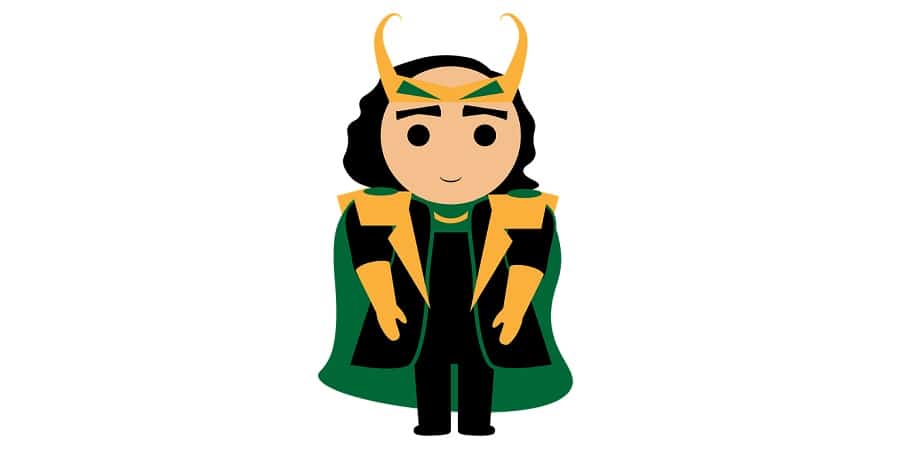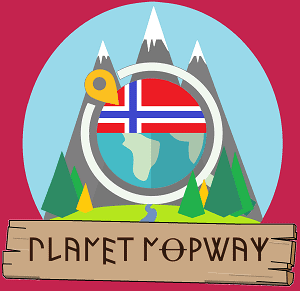Loki is notorious for his inability to be classified among the Norse gods. Without worshippers, he is the son of a giant and a little-known goddess. As such, he always stood out as an outsider amongst the Æsir (Norse gods).
He is a complex god with both a villainous and helpful side, and yet his help often came in ways at odds with the honor of a Viking man. In this way, his suggestions often could not have been thought of or completed by other gods.
In the article, you’ll find out who Loki was, including his powers, roles, and family, and explore a few of the sagas that feature him.

Who was Loki?
Loki is a cunning trickster god with the ability to shapeshift. He takes countless forms in the sagas. Although he was never worshiped in his own right, he was a deity of great importance to the Norse Pantheon.
Loki often went on adventures with Odin and Thor, offering his own clever ideas to help their plans, but just as often inciting chaos and difficulties for everyone involved. He is often thought of as the enemy of the Gods. However, this does little justice to his unique place in the sagas.
He indeed caused many problems, even the death of the beloved god Balder. For this, he was punished by being chained to a rock with a serpent hovering over him, dripping its venom onto him.
This causes Loki agonizing pain, and his screams are said to cause earthquakes. This tale shares many similarities to that of Prometheus in Greek Mythology.
He does appear to have no regard for the lives and well-being of the other gods throughout the myths. He similarly appears to break all societal conventions, changing his gender, role, and ambitions almost at will.
His general personality is of a cowardly schemer who jumps from one small pleasure to another, persuaded only by self-preservation when in conflict with others.
His wife Sigyn holds a bowl up to collect the venom and save Loki from constant harm, but she must still pour it out whenever it becomes full, allowing the venom to fall upon Loki again for a moment.
His most famous power is his shapeshifting, taking the form of a mare, a fly, an older woman, and a salmon in different stories. He can be both helpful and malicious, but always from an outsider’s perspective.
At the beginning of Ragnarök, it is said that Loki will escape his chains and fight against the gods with the jötnar (giants). He will fight Heimdallr, and they will kill one another.
For centuries, Loki’s name has been an enigma for scholars, but a strong theory has recently emerged.
Scholars have noticed that Loki often appears in places that compare him to a knot on a thread. Sometimes, the word Loki can even mean “knot.”
Metaphorically, spiders are sometimes referred to as “Loki” for their tangled webs. This lineage means that Loki’s name might simply refer to “knot” or “tangle,” which makes a lot of sense based on his role in the mythology.
Family
Loki’s family history is quite complicated, helping to explain his role in mythology. His father was the giant Fárbauti and his mother was the goddess Laufey but was counted amongst the gods. He has two brothers Helblindi and Býleistr.
Loki himself had many children, including Hel, the goddess of death; Jörmungand, the huge world serpent; and Fenrir, the wolf. All of whom he had with the giantess Angrboða. When he was a mare, he also gave birth to Sleipnir, Odin’s eight-legged horse.
Loki is married to Sigyn, who catches the venom that drips from above him in his punishment. They had a son named Nari.
Mythology (in the sagas)
In one important tale, Loki comes into the great hall of the gods, where they are discussing their prowess in war over ale.
He mentions at the door that he will mix their mead with malice to induce fighting amongst them when he hears that they will not say a good thing about him.
Calling the gods arrogant upon his entrance, he demands a seat at their feast. Bragi tells him he will not get a seat, for they know who they should and should not invite.
Loki turns to Odin and recounts that Odin had said he would never drink ale long ago without Loki having some too when they are together. Odin hears him and gets his son Víðarr to give Loki his seat.
Loki calls for a toast among all the gods except Bragi, and they begin to argue. He begins to accuse different gods of things, starting with Iðunn, whom he calls the most “man-crazy” of all women.
As Loki turns to insult Gefjun, Odin calls Loki insane for trying to make an enemy out of her. Loki then turns to insult Odin, saying he is terrible at giving honor in war.
Odin, in turn, accuses Loki of acting like a woman for eight winters underground with cows, perhaps even giving birth while there.
Loki then retorts that Odin himself has practiced seiðr, or womanly sorcery, and is thus equally perverse as he.
Frigg intervenes, claiming that the ancient past should not be spoken of to others. Loki reminds Frigg that he had killed her beloved son Baldur.
Freyja then declares Loki mad, and Loki accuses Freyja of having slept with all the gods and elves. She says he is lying and says that he has made an enemy of the whole hall.
This back and forth continues with more and more gods and goddesses as Tyr jumps in and Loki reminds him that it was his son, the wolf Fenrir, which bit his hand off.
Tyr responds that while he lost his hand, Loki lost his son, as Fenrir is now shackled until Ragnarök.
After this, Freyr says that if Loki does not stop, he too shall be bound until Ragnarök. Loki responds by insulting Freyr, and more gods join in supporting getting rid of Loki.
Thor arrives and tells Loki to be quiet, calling him evil and saying he will silence him with his hammer Mjöllnir. Loki begins insulting Thor, and Thor threatens him again.
After a long back and forth, he finally agrees to leave, giving one final insult to the whole hall. He then tries to disguise himself as a salmon to escape as the gods chase after him, but they find him and bind him.
Loki’s most important story is perhaps the one that paints him as a villain, which is his role in the death of Baldur.
In it, the death of the beloved god Baldur is foretold, and his mother Frigg gets every living thing to promise to do no harm to her son. But, unfortunately, she did not secure a promise from mistletoe, which was deemed too harmless.
Loki finds this out and creates a spear tipped with mistletoe. He gives it to the blind god Hod for a game and asks him to throw it at Baldur. So he does, not knowing it could harm Baldur, and Baldur dies.
Afterward, the gods implore Hel to release Baldur, for he is so beloved. She says that if this is so, then get every living being to weep for Baldur, which they did. Except one, the giantess Tokk, who was Loki in disguise. Therefore, Baldur must stay with Hel.
Finally, in a story showing another side of Loki, Thor wakes up one morning to find his hammer Mjöllnir is missing. He asks Loki to help him find it, and they find the goddess Freyja to ask her for her feather cloak to help them travel.
They eventually find that the giant Þrymr has hidden Mjöllnir eight leagues beneath the earth and he will only release it if Freyja is brought to marry him.
Loki and Thor hatch a plan for Thor to dress as Freyja and for Loki to dress as his maid. They head back to retrieve the hammer.
Thor’s disguise begins to fail when he eats and drinks ferociously at the feast held for their “wedding.” But Loki explains that Freyja hadn’t eaten much for eight days due to her excitement to arrive.
After a few more close calls, Mjöllnir is brought out and laid as a gift to “Freyja.” Thor laughs to himself and takes the hammer, defeating all the giants and escaping afterward with Loki.
How important was Loki?
Despite not being worshiped, he remains one of the most important gods due to his interactions with the other gods and goddesses and his offspring’s role in Ragnarök.
By playing the trickster, he is often the narrator of many insults and stories of the worst gossip we have of each of the other gods.
In that way, he is somewhat of a ‘truth revealer’ breaking through hypocrisies expressed by other gods. He, however, is quite nihilistic and self-interested and, for that reason, could likely never be openly worshipped.
Furthermore, he acts contrary to societal health and expectations as he constantly sows chaos and shapeshifts into unflattering forms.
Each of his children Hel, Fenrir, and Jörmungand play important roles in many of the myths, typically on the side of some kind of evil, but not necessarily on the side of the enemy, the giants.
Hel plays an essential role in regulating the underworld for those not taken by Odin or Freyja. At the same time, Jörmungand plays a role in encircling the whole world and allowing time to flow, as when he stops, Ragnarök is said to follow.
Both Jörmungand and Fenrir play a significant role in Ragnarök, and Fenrir also took Tyr’s hand before getting bound.
In popular culture
The most prominent role Loki has played in recent times has been the Marvel character Loki, played by Tom Hiddleston.
He was introduced as a villain in The Avengers movie but has grown into a complex character, not unlike the Loki of Norse Mythology.
He has a fraught relationship with his brother Thor but has become a fan favorite, gaining his own TV Show called Loki in 2021.
He also appears in many video games, including Smite, Assassin’s Creed Valhalla, Age of Mythology, and God of War.
